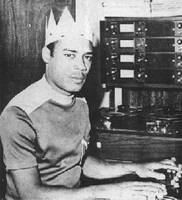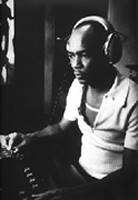|
KING TUBBY
Born on January 28 1941, Osbourn Ruddock and died on February 1989. King Tubby spent his childhood stomping around High Holborn Street in Central Kingston. Later in 1955 aged 16 he moved to Waterhouse where he embarked on a career repairing radios. It did not take him long to realise where his creative ingenuities lay, and the late 50s soon found him experimenting with sound system amplifiers that would in days to come herald him as one of the leading pioneers of the sound system revolution. By 1968 King Tubby was operating his own self made apparatus, 'Tubby's Home Town HiFi' adding an additional touch of class by incorporating a reverb and echo facility to the system. During this time Tubby was also working as a disc cutter for Duke Reid and it was here that he became inspired to remake well loved rocksteady tunes as, Special Versions. The procedure he began entailed firstly, cutting out most of the vocal track and fading it at suitable points. Then reducing the mix down to bass only and dropping other instrumental tracks in or out and with the advent of this dub was born. In the beginning Tubby's technique was recorded on to dub plate for exclusive use only. The spaces left in the mix were skillfully planted for the DJ to overtake and splash out his lyrics, already paving the way for future rap artists to emerge and evolve the trend. Record producers soon saw the potential for commercial success these special versions offered and what with others like Joe Gibbs, an engineer and Errol Thompson, who started out at Randy's Studio 17, jumping on the band wagon King Tubby had single handedly set up. Producing instrumental dub versions taken from the original track were now all the rage, from now on where the original song could be found the trend had begun for the flip side to reveal its dub version.
With this in full swing and so many people rising to the challenge to produce new styles and enhancements to reggae music it was clear King Tubby was going to have to invent new waves to keep him ahead of his competitors. This was not a difficult task for Tubby for whom fresh challenges came naturally. His obvious step was then to upgrade the already in progress delay-echo. slide fades and phasing, using an old four track mixing desk acquired from Dynamic studios. Tubby started to work with producers like Lee Perry, Bunny Lee, Glen Brown, Augustus Pablo and 'Prince' Tony Robinson from '71-'72 onwards. Tubby featured on the B side of one of Robinson's tracks ("Tubby's In Full Swing") and was credited for it, it led to a series of producers recognising and crediting him for his skills in dub music. Throughout the 70s Tubby mixed dubs for many acclaimed producers including the afore named and others such as Roy Cousins, Winston Riley, Carlton Patterson, Vivian "Yabby You" Jackson and Bertram Brown's Freedom sounds.Probably Tubby's most important work was for Bunny Lee, Lee used Tubby's skills for dub and voicing on earlier rhythms put together in sessions with the Aggrovators. Bunny Lee began to produce dub albums featuring King Tubby mixes and other producers soon began to demand the Tubby talent for their own cuts. Tubby's name appeared on over 100 albums and many engineers trained under King Tubby's supervision. Among these trainees were King Jammy and 'Prince' Philip Smart, both of these men went onto become great achievers in their own right.
Tubby's success during this period enabled him to furnish plans for a future studio of his own. By 1988 he had begun yet again to expand his accomplishments by taking on board the world of digital technology, featuring a new wave of ragga singers including; Pad Anthony, Courtney Melody, Anthony Redrose, Pliers, Ninjaman, etc. Tragically, this was shortlived just when he was on the brink of taking on the major producers, like Jammy & Gussie Clarke, a gun man shot him outside his home in Jamaica. Shock waves went through the whole of the music industry and beyond. KingTubby was responsible for development of dub mix, lyrical DJ 'licks' over the instrumental tracks (prior to the rap phenomenon that was to take over the USA) and the prominence of drum and bass within the mix, at grass roots level. His contribution to the sound systems and dub techniques spanning three decades mark him as one of the corner stone legends of reggae music past, present and future.
_ |




